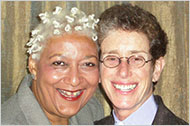Diane Sabin is the executive director of The Lesbian Health & Research Center a UCSF. She directs programs working in collaboration with community organizations that develop information about and educate communities about the health of lesbians, bisexual and transgender women. She is also the administrative director of the Osher Center for Integrative Medicine.
E: Diane, tell us about the Lesbian Health and Research Center and what you hope to accomplish with it’s programs?Â
DS: LHRC has hosted scholars doing research in many aspects of health, we’ve partnered with organizations like Queer Women of Color Media Arts Project (QWOCMAP) and ZUNA Institute to do conference presentations to spread the word about the importance of health care for lesbians, bisexuals women and transgender people of color. We want to continue to spread the word so that our “Ask Us†public health website page keeps getting “hitsâ€. We get many questions from people looking for answers and for a lot of reasons they have nowhere else to go to ask them. We do our best work when we can partner with other community organizations and develop new awareness about health issues in difference communities. We want to continue those collaborations and partnerships and work with an ever widening array of organizations.
E: What led you to become the ED the Lesbian Health & Research Center?
DS: For almost two decades I headed my own community health clinic in the Castro. When I had an injury and had to leave my chiropractic practice, I found that the health field did not leave me. So I did some work with the UCSF National Center of Excellence in Women’s Health for a while then moved over to LHRC because the gap in our knowledge about lesbian health is huge. The medical establishment is just beginning to take a direct look at the real structural/systemic/behavioral differences between women and men and how that might affect health care. Even less has been done to look at the specific aspects of the health of lesbians; and just as importantly few organizations have done the work to get lesbians to pay better attention to our health needs. Smoking, heart disease, breast cancer, high blood pressure—what do we know about how lesbians are affected? LHRC is in the position to open up the avenues to those answers.
E: You and your partner, Jewelle Gomez were one of 12 couples who filed suit against the State of California 8 years ago petitioning for the right to marry. Is that still going on? What has that been like for you two?

DS: Jewelle and I participated as litigants when Kate Kendell of NCLR asked us because we felt marriage is a civil right and we thought it was important to step up even if we ourselves, as feminists, have questions about the institution of marriage itself. We spent 4 years responding to reporters and lawyers questions and kind of living in a fishbowl. Jewelle is easier with that kind of spotlight because she performs her readings in public. I’m more used to working behind the stage to make things happen, but we both have strong feelings about doing and not just talking. Our case is not the immediate one; now it’s down to what the superior courts will say about the most recent court case. This is the case that should take us to the federal level. And that’s the gold standard: can we get the federal government to live up to the promise of our civil rights?
E: Tell us more about your early years as a producer of Lesbian scene in the 70’s.
DS: It the 1970s Lesbian feminist culture was blossoming, there were women’s bookstores, concerts, lesbian publishers and magazines everywhere. I loved being part of a production company. To be able to bring lesbian musical performers to the stage, seeing how it galvanized women and helped energize the lesbian feminist movement. One of our productions was to bring Sweet Honey in the Rock to sing in Boston in 1974. It was a groundbreaking moment for both that amazing acapella singing group, which is now internationally known; and for the Boston women who saw themselves reflected in such an electrifying group of performers. Each production I’ve done is about community building – from Sweet Honey, to producing a play by poet Cheryl Clarke, to managing the stage at the early SF Lesbian and Gay Celebration to more recently LHRC’s launch of the first textbook on lesbian health.
E: Anything else you’d like to add?
DS: Technological developments have drastically changed how we communicate with each other over the past 30 years. But what we need to communicate remains the same: women in general and lesbians specifically are not valued in the culture. We are disappeared or pressured into traditional roles, objectified or brutalized with very little question. Fortunately many lesbians are extremely resilient and have much to teach each other and others about how we’ve already made our world better and that we’ll always do that.
Find out more about he LHRC at: www.lesbianhealth.org Please donate to help them continue their work. And please, share this video with your friends!


